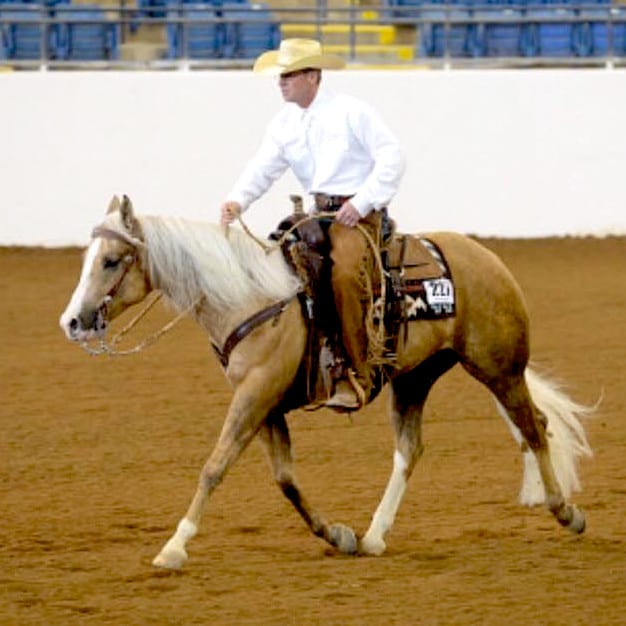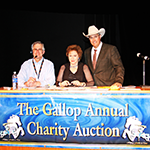There is no doubt that the ranch riding (formerly, ranch horse pleasure) classes have exploded in recent years at AQHA and APHA shows. This exciting, fast paced event is quickly becoming one of the largest classes at many shows across the country. For instance, at the 2015 AQHA World Show, the Junior and Senior Ranch Riding boasted an impressive 179 entries combined.
Ranch riding is nothing new to AQHA. The class launched in 2002 as part of the Versatility Ranch Horse division, along with ranch trail, ranch cutting, working ranch horse, and ranch conformation. In 2012, the class was approved for the AQHA Open World Show. In 2013, it was added to the class list for the AQHYA, Adequan Select, and Amateur World Shows. In 2014, APHA followed suit by adding ranch horse pleasure (now, ranch riding) to their list of approved classes. At the 2015 APHA Convention, APHA approved four new ranch classes- ranch trail, ranch pleasure, ranch reining, and ranch cow work.
There are many theories as to why this class has become so popular. We asked some AQHA and APHA amateurs, trainers, and judges, to see what their thoughts were. They all agreed on one big point- it is NOT because this class is “better” than western pleasure. The premise of this class is completely different from that of pleasure. While both are judged on the movement of the horse, this class allows for a new kind of all around horse.
Back to our Roots
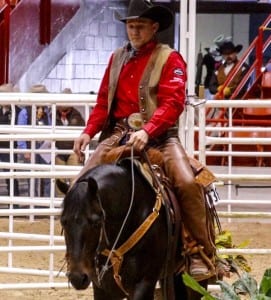 When asked why ranch riding is so popular, one of the common themes was that this class brings us back to where we started. Judge, Jennifer Moshier, remarks, “When I first started cutting my teeth in the show ring in the 70s in central New York, it was this horse that came out and showed all day in everything and anything western. These were working horses that also were ridden on the trails, did farm work, even tried a few hunt seat classes with the kids at the county fair.”
When asked why ranch riding is so popular, one of the common themes was that this class brings us back to where we started. Judge, Jennifer Moshier, remarks, “When I first started cutting my teeth in the show ring in the 70s in central New York, it was this horse that came out and showed all day in everything and anything western. These were working horses that also were ridden on the trails, did farm work, even tried a few hunt seat classes with the kids at the county fair.”
As times have changed, we have become fantastic at breeding horses specialized for particular events. While it is not impossible, it is rare to find a horse that can not only go work on the farm during the day, but then go out to a show on the weekends and show off their movement and athleticism in the show pen. Ranch riding has given those horses a place to compete.
User-Friendly
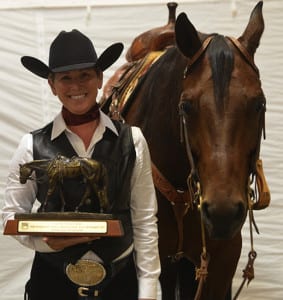 AQHA judge and leading ranch riding trainer, Steve Meadows, noted that this class is a great “ice breaker” for the everyday competitor. The class doesn’t require expensive, blingy tack or show clothes, in fact, the rule book doesn’t allow for it. All that is needed is clean tack and a horse with athleticism and good movement.
AQHA judge and leading ranch riding trainer, Steve Meadows, noted that this class is a great “ice breaker” for the everyday competitor. The class doesn’t require expensive, blingy tack or show clothes, in fact, the rule book doesn’t allow for it. All that is needed is clean tack and a horse with athleticism and good movement.
AQHA Professional Horseman Adam D’Agostino shares similar sentiments to Meadows about this class, while offering a slightly different perspective. D’Agostino is an instructor and coach at Cazenovia College in New York, where he teaches students of various riding levels, using horses of drastically different backgrounds.
D’Agostino states that by teaching ranch riding, he is able to tailor his program to a variety of students. Ranch riding is a class where everyone can learn something. A green rider that had limited to no show ring experience can learn just as much as an experienced rider with years of experience at the highest levels. He can also utilize horses of various backgrounds with much success- from the retired western pleasure horses, to world level reiners.
Versatility
According to the AQHA Rule Book, “The horse’s performance should simulate a horse riding outside the confines of an arena and that of a working ranch horse.”
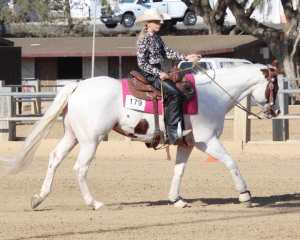 This can certainly be seen, as the maneuvers asked for in the class are much like those asked for on the range. The horses must show forward movement at the walk, jog, extended jog, lope, and extended lope. They also must exhibit smooth lead changes and a turnaround of at least 360 degrees. Some patterns require the horse to side pass or walk or jog over poles. Meadows compares the class to a combination of western pleasure, trail, western riding, and reining. Because of this, the class shows off the true versatility of the quarter horse. It takes a well broke, honest horse with great movement to win in ranch riding.
This can certainly be seen, as the maneuvers asked for in the class are much like those asked for on the range. The horses must show forward movement at the walk, jog, extended jog, lope, and extended lope. They also must exhibit smooth lead changes and a turnaround of at least 360 degrees. Some patterns require the horse to side pass or walk or jog over poles. Meadows compares the class to a combination of western pleasure, trail, western riding, and reining. Because of this, the class shows off the true versatility of the quarter horse. It takes a well broke, honest horse with great movement to win in ranch riding.
AQHA Judge Mike Bednarek recalls judging the Oregon Summer Classic last year. He was incredibly impressed by the versatility of the horses competing in ranch riding. Many of them not only were able to execute all of the maneuvers asked for in the class with precision, but they also excelled in other classes, such as roping and cutting. He believes that the addition of ranch riding gives these horses another place to show off their movement and trainability.
Anyone Can Succeed
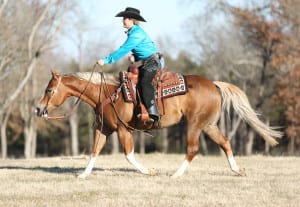 One of the strongest factors that draws people to ranch riding is that there is no set “type.” The closest thing to an ideal for this class is that which has been mentioned previously- a broke horse with fantastic movement. This opens the door for a variety of exhibitors. Retired pleasure horses and working ranch horses can be seen competing side by side at shows across the country.
One of the strongest factors that draws people to ranch riding is that there is no set “type.” The closest thing to an ideal for this class is that which has been mentioned previously- a broke horse with fantastic movement. This opens the door for a variety of exhibitors. Retired pleasure horses and working ranch horses can be seen competing side by side at shows across the country.
D’Agostino notes that the horse that got him excited about the class is actually a horse that had a successful show career as an all around horse, earning hundreds of points in everything from western pleasure to hunt seat equitation. The horse’s owner wanted to try something new, so they gave ranch riding a try, with much success. While Meadows also does not believe that there is one set “ideal” for the class, he has found it is a fantastic place for horses that didn’t have the fire to excel at the highest levels of NRHA to show off their movement and athleticism.
Room to Improve
 APHA Amateur competitor, Renate Finley, states that, “We can all start with a horse that has quality, forward movement in all gaits. Then our goals are to have our horse as broke as we can get them, and to perfect the transitions between changes of gait. Next, we can all work on finessing the pattern as a whole from our pattern placement in the arena, to exhibiting our horse in a way to showcase that horses best qualities as we perform the pattern to the judges. These goals are all challenging, but certainly things that everyone can enjoy working hard at to have success in their ranch riding classes.”
APHA Amateur competitor, Renate Finley, states that, “We can all start with a horse that has quality, forward movement in all gaits. Then our goals are to have our horse as broke as we can get them, and to perfect the transitions between changes of gait. Next, we can all work on finessing the pattern as a whole from our pattern placement in the arena, to exhibiting our horse in a way to showcase that horses best qualities as we perform the pattern to the judges. These goals are all challenging, but certainly things that everyone can enjoy working hard at to have success in their ranch riding classes.”
Finley and her mare, Gunner Hold Your Fire (pictured right), were the inaugural APHA Novice Amateur Ranch Horse Year End All Around Champions in 2015.
Finley is exactly right- every horse and every rider can improve on something in this class. This makes it exciting for many competitors. Because it is a scored event, it can be very clear to exhibitors what they need to work on. There is always something to strive for. As with every class, the biggest competition for a ranch riding competitor is the ride they had the day before. This just gives one more outlet for competitors to strive for perfection, while still having fun.
Stepping Stone
Meadows mentioned that this class is an excellent platform to lead into the other events, such as reining and working cow horse. Much like western pleasure is intended to be a platform for horses and exhibitors to get their feet wet before moving into trail and western riding, ranch riding is a great place for horses to start when moving into other ranch-related events.
It’s FUN!
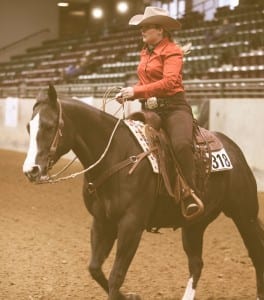 It is not uncommon to see ranch riding exhibitors sitting outside the ring at a show, cheering each other on. Finley says it best when she says “The camaraderie amongst the ranch riding exhibitors at the shows I’ve been to is electric.”
It is not uncommon to see ranch riding exhibitors sitting outside the ring at a show, cheering each other on. Finley says it best when she says “The camaraderie amongst the ranch riding exhibitors at the shows I’ve been to is electric.”
This fun, exciting class always draws a crowd at shows. When people see the face-paced excitement the class has to offer, they want to try it out. Matt Adkins, one of the authors of the rule change proposal that brought about the ranch horse program in APHA, says, “spend just a few minutes along the rail during ranch riding and you’ll see the encouragement and enjoyment being had.”
D’Agostino suggests that the most enjoyable part about competing in ranch riding may very well be the training process for the class. He feels as though the best ranch horses are made outside the arena.
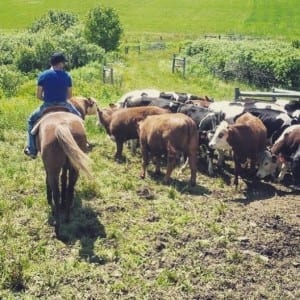 To train his ranch horses, D’Agostino utilizes the many hills and fields surrounding his Upstate New York farm. He has found that his is not only beneficial for his horses that compete in ranch riding, but all of the horses in his program. Not only is it a great workout, but it allows the horses to become more broke and relaxed in any situation.
To train his ranch horses, D’Agostino utilizes the many hills and fields surrounding his Upstate New York farm. He has found that his is not only beneficial for his horses that compete in ranch riding, but all of the horses in his program. Not only is it a great workout, but it allows the horses to become more broke and relaxed in any situation.
Ranch riding successfully combines the finesse and grace of trail, western riding, and western pleasure with the fire of reining and working cow horse events. It offers a place to anyone to compete, allowing them room to improve and new goals to reach with every class. For these reasons and more, it is easy to see why it is one of the fastest growing classes in APHA and AQHA.
Thank you to Steve Meadows, Adam D’Agostino, Mike Bednarek, Renate Finley, Jennifer Moshier, and Matt Adkins for your input!


